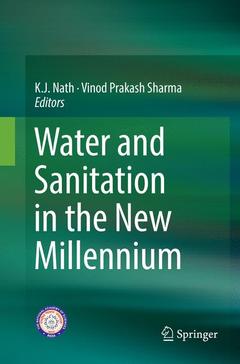Description
Water and Sanitation in the New Millennium, Softcover reprint of the original 1st ed. 2017
Coordinators: Nath K..J., Sharma Vinod Prakash
Language: English
Publication date: 08-2018
Support: Print on demand
Publication date: 10-2017
Support: Print on demand
Description
/li>Contents
/li>Biography
/li>Comment
/li>
This contributed volume is about water resources, their variability with prevalent environmental conditions and its sustainable management in India.
Water has always been the life line for survival. An adequate supply of safe drinking water is one of the major pre-requisites for a healthy life. Time and again water has been a means of consolidating power in the human society. In the beginning of the new millennium, water has become a major issue in India. India is known to have the gift of its unique river systems have abundant water resources but ironically India faces severe water crises and other water management issues on a vast scale.
The water related issues in India varies with both time and space. From crises of potable water, lack of sanitation, water borne diseases, to pesticide and heavy metal contamination, water related predicaments are highly prevalent in India and are more grave in rural set up.
Dr. Vinod Prakash Sharma, M.Sc. 1960; D.Phil. 1964; D.Sc. 1979 all from Allahabad University, Post Doctoral Research Associate, University of Notre Dame and Purdue University, USA (1964-1968); Pool Officer, Forest Research Institute, Dehradun (1969-1970); Senior Scientist WHO/ICMR Unit on Genetic Control of Mosquitoes, New Delhi (1970-1975), Deputy Director Vector Control Research Centre/Malaria Research Centre (1975-1982); Founder Director National Institute of Malaria Research (1962-1998), and Additional Director General Indian Council of Medical Research (1998). He is FNA, FASc, FNASc, FAMS, FTWAS, and Fellow of several other learned societies. He has specialized in Malaria & Vector Biology. He has 40 years of research and field experience, published c400 scientific papers, book on Anopheles and edited 14 books. Under his leadership NIMR had earned international reputation of excellence in malaria research and control, and established linkages with leading national and international laboratories.
Prof. K.J. Nath is widely regarded as one of India’s foremost experts on Community Water Supply and Sanitation, Environmental Health and Public Health Engineering. For over four decades, he has played a variety of roles ranging from project engineer, researcher, academician, teacher, consultant, planner and in the process has won nationwide and international acclaim and recognition. As Professor of Environmental Sanitation and Director of the All India Institute of Hygiene & Pubic Health (AIIH&PH), Govt. of India (GOI), he did seminal works on rural and urban water supply and sanitation, urban waste management, air and water pollution, water quality surveillance, environmental epidemiology and impact assessment.
Elucidates a diversity of issues on water resources, sanitation and sustainable management
State-of-the-art coverage on water related issues in India by authoritative contributors in the field
Offers a comprehensive collection of latest information and technology on water management and sanitation -The book includes a critical analysis of the key issues and concerns and emerging challenges for providing safe water and sanitation to the people of India
These books may interest you

Water Conflicts in Northeast India 160.25 €



